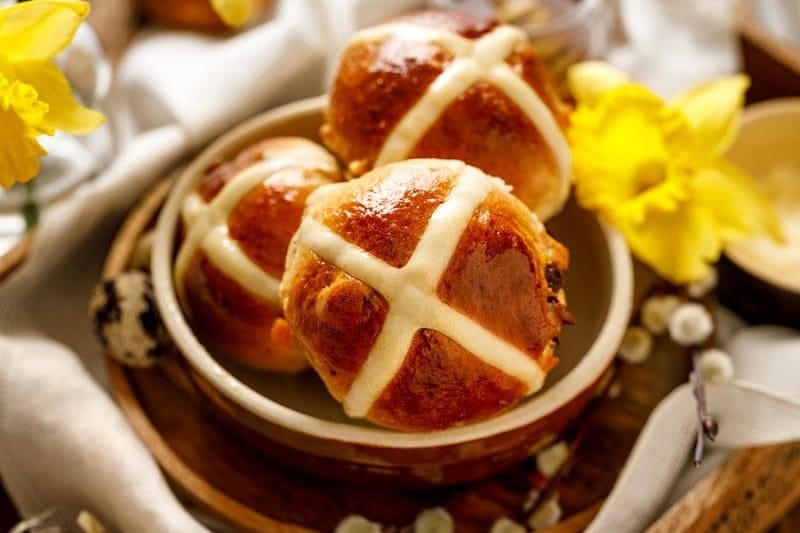Hot Cross Buns
"They’ll not grow mouldy like the common bread." Words from a rhyme in 1733.

Key words
- Communion: a Christian ceremony based on Jesus' last meal with his disciples
For thousands of years, Christians have taken communion by eating a small piece of bread and drinking a sip of wine.
- Last supper: the meal that Jesus Christ ate with his friends the night before he died
The Last Supper occurred on the Jewish festival of Passover.
- Mass: a religious ceremony in some Christian Churches based on Jesus' last meal with his disciples
Mass is the central act of worship in the Roman Catholic Church.
- Ailment: an illness
Respiratory ailments become more common in winter.
- Walk of life: referring to different types of jobs and different levels of society
People from all walks of life - including lawyers, teachers, plumbers and hairdressers - have joined.
Read the article to find the answers
- When was the name 'hot cross bun' first used?
- What do many Christians believe the bread eaten at communion is miraculously transformed into?
- What did some people believe the bread baked on Good Friday had?
- Who likes to eat hot cross buns today?
Hot Cross Buns
In England, there's a centuries-old tradition of baking special buns with a cross on them. These are known as hot cross buns. The earliest mention of hot cross buns dates back to 1733, when they were made and eaten as a treat at Easter, but today hot cross buns can be found on supermarket shelves as early as January.
Communion / Eucharist
When England changed from a Catholic to a Protestant country, many Christians believed that the bread eaten at Communion was miraculously transformed into the actual body of Christ. Jesus said:
"I am the bread of life. Whoever comes to me will never hunger."
According to the Gospels, Jesus was eating a traditional Jewish Passover meal when he blessed the bread and told his followers that the bread was his body. This was his last meal before he was killed, and Christians eat a small piece of bread in the ceremony known as communion to remember him.
As England moved from Catholicism to Protestantism, there were significant changes in religious practice and communion was one of the key issues. The belief in the actual presence of Christ in the bread is still at the heart of the Catholic faith, and many Protestants share this belief. Others see the bread as being symbolic because Jesus said that the Kingdom of God is spiritual.
Superstition
In medieval England, 'Holy Bread' was placed in a special box representing Christ's tomb on Good Friday and guarded until it was taken out and shared at Mass on Easter Sunday. Protestants saw this practice as idolatry, as the bread became the object of worship instead of Jesus, and the ritual was done away with in the Reformation.
Hot cross buns as we know them today were originally frowned upon by the Puritans as a remnant of Catholic superstition. Some people believed that bread baked on Good Friday was holy bread and had special healing powers, especially for stomach ailments. According to a 19th century Protestant writer:
"The hot cross bun is the most popular symbol of the Roman Catholic religion in England left over from the Reformation."
Despite this, hot cross buns have remained a part of popular culture and are enjoyed by people from all walks of life.
Discussion questions
- Do you have any questions about any of the vocabulary or grammar in this article?
- What do you know about Jesus's last supper?
- Does any food have religious significance in your country?
- What kind of bread is most popular in your country?

Book a Lesson
Improve your English language communication skills by practicing with a qualified and experienced native speaker.





